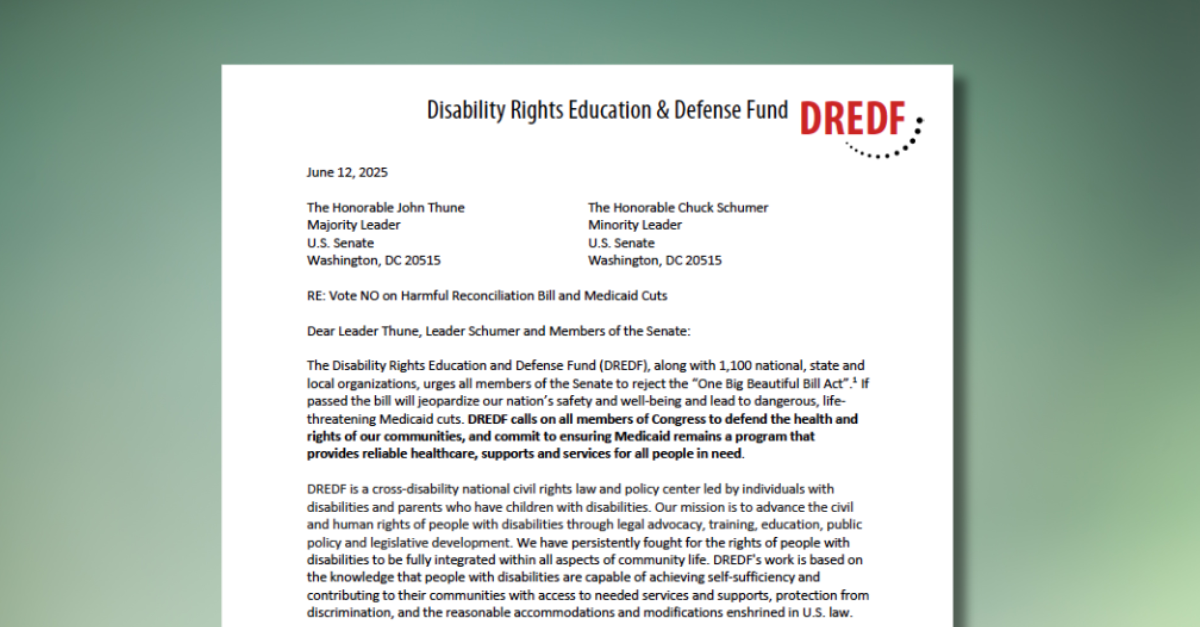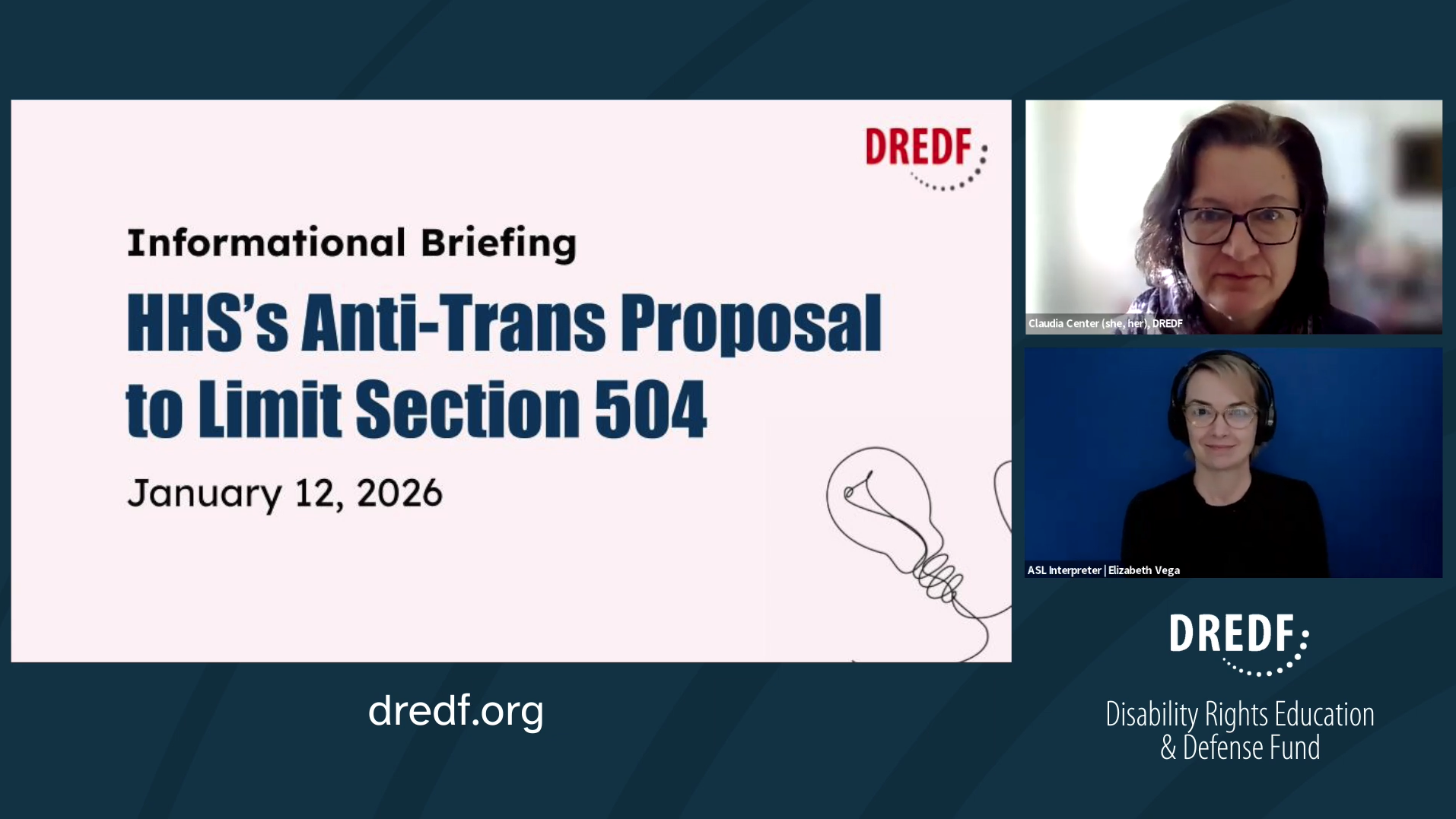
Download the PDF
Download the .doc
June 12, 2025
The Honorable John Thune
Majority Leader
U.S. Senate
Washington, DC 20515
The Honorable Chuck Schumer
Minority Leader
U.S. Senate
Washington, DC 20515
RE: Vote NO on Harmful Reconciliation Bill and Medicaid Cuts
Dear Leader Thune, Leader Schumer and Members of the Senate:
The Disability Rights Education and Defense Fund (DREDF), along with 1,100 national, state and local organizations, urges all members of the Senate to reject the “One Big Beautiful Bill Act”.[1] If passed the bill will jeopardize our nation’s safety and well-being and lead to dangerous, life-threatening Medicaid cuts. DREDF calls on all members of Congress to defend the health and rights of our communities, and commit to ensuring Medicaid remains a program that provides reliable healthcare, supports and services for all people in need.
DREDF is a cross-disability national civil rights law and policy center led by individuals with disabilities and parents who have children with disabilities. Our mission is to advance the civil and human rights of people with disabilities through legal advocacy, training, education, public policy and legislative development. We have persistently fought for the rights of people with disabilities to be fully integrated within all aspects of community life. DREDF’s work is based on the knowledge that people with disabilities are capable of achieving self-sufficiency and contributing to their communities with access to needed services and supports, protection from discrimination, and the reasonable accommodations and modifications enshrined in U.S. law.
Make no mistake, the proposed bill would lead to 16 million people losing health coverage and terminate Medicaid and CHIP coverage for at least 10 million people.[2] Homecare services that are optional for states to provide, but not optional for people who need them, will inevitably be reduced.[3] The proposed text targets already vulnerable low-income people, people with disabilities, students, immigrants, transgender people, and Black, Brown and Tribal communities.
Provisions that will harm people with disabilities, our neighbors and families, include but are not limited to:
- Inefficient and burdensome job loss penalties for adults up to age 64 yrs and increased eligibility renewals.[4] While there are carve outs for the penalties, the bases for disability exemptions are very narrow. States will bear the costs of implementing the complicated provisions. Low-income people who need insurance to be healthy enough to work will lose access to care, be barred from obtaining marketplace coverage, and face health-related barriers to employment;[5]
- Cuts to funding for Medicaid under the Affordable Care Act by 10% in states that use their own taxpayer dollars to provide health care to certain immigrants;
- Prohibiting coverage of medically-necessary and evidence-based transition-related healthcare for trans people of all ages and exclusion of all transition-related healthcare as an Essential Health Benefit EHB under state marketplace plans;
- Mandated out-of-pocket costs for some adults who rely on Medicaid for their health insurance if they have incomes 100-138% of the federal poverty level (FPL). FPL is currently a mere $15,650 a year for an individual or $32,150 for a household of 4.[6] These fees could lead to fewer visits for preventative, rehabilitative, or even critical care;
- Denial of future healthcare access to people living in states that have not taken advantage of additional Medicaid enrollments through the Affordable Care Act;
- Preventing a new rule from going into effect that would require nursing homes and long-term care settings to provide care each day to keep older adults and people with disabilities safe; [7]
- Prohibition of funding to community providers that offer critical reproductive healthcare to millions of low-income and uninsured people, including for people with disabilities in rural areas. Without access to these centers, barriers will be created to preventive and sexual and reproductive health care such as mammograms, cancer screening, pap smears, STI testing, contraceptive counseling, and prenatal care;
- Cuts of nearly $300 billion from the Supplemental Nutrition Assistance Program (SNAP) which would disproportionately decrease access to food for students, single mothers and their families;[8]
- Repealing of funding to address air pollution in schools which would disproportionately harm students with disabilities and chronic health conditions;
- Prohibiting states from regulating artificial intelligence systems for 10 years, including testing solutions that address unintended bias, discrimination and environmental impacts;[9] and
- Limiting the authority of the federal courts that interpret and guard the U.S. constitution and our civil rights by restricting the courts’ power to hold parties and people in contempt if they fail to tell the truth or comply with the courts’ orders.[10]
DREDF believes that health care and access to healthy and safe communities is a human right for all people. No matter our disability, race, gender, sexual orientation, citizenship status, income, or ZIP code – we all deserve to access the care and services we need to live, full stop. Without these services and programs people will die.
The efforts of courageous disabled activists and Congressional members helped save Medicaid in 2017. We call on all members of Congress to reject the harmful proposals and defend Medicaid and the programs people in all states need to live safe, healthy and fulfilling lives.
Please do not hesitate to reach out with any questions by contacting Carol Tyson, Government Affairs Liaison, ctyson@dredf.org, and Silvia Yee, Policy Director, syee@dredf.org.
Sincerely,
Michelle Uzeta
Interim Executive Director
[1] https://www.c-c-d.org/fichiers/Senate-Aging-Disability-Letter-from-1100-Organizations-on-Medicaid-and-FY25-Reconciliation-Bill.pdf
[2] https://www.cbo.gov/system/files/2025-06/Wyden-Pallone-Neal_Letter_6-4-25.pdf
[3] https://geigergibson.publichealth.gwu.edu/history-repeats-faced-medicaid-cuts-states-reduced-support-older-adults-and-disabled-people
[4] https://www.cbpp.org/blog/more-frequent-medicaid-renewals-would-increase-errors-and-lead-eligible-people-to-lose-health
[5] https://healthlaw.org/resource/top-10-reasons-why-house-republicans-work-requirement-proposal-will-harm-low-income-people/
[6] https://www.kff.org/tracking-the-medicaid-provisions-in-the-2025-budget-bill/ and https://www.medicaidplanningassistance.org/federal-poverty-guidelines/
[7] https://www.cms.gov/newsroom/fact-sheets/medicare-and-medicaid-programs-minimum-staffing-standards-long-term-care-facilities-and-medicaid-0
[8] https://www.cbpp.org/research/food-assistance/house-reconciliation-bill-proposes-deepest-snap-cut-in-history-would-take
[9] See DREDF concerns and recommended guardrails at: https://dredf.org/disability-bias-in-clinical-algorithms-recommendations-for-healthcare-organizations/ and https://dredf.org/addressing-disability-and-ableist-bias-in-autonomous-vehicles-ensuring-safety-equity-and-accessibility-in-detection-collision-algorithms-and-data-collection/
[10] https://www.findlaw.com/legalblogs/federal-courts/big-beautiful-bill-contains-small-provision-seeking-to-render-previous-judicial-contempt-orders-unenforceable/


